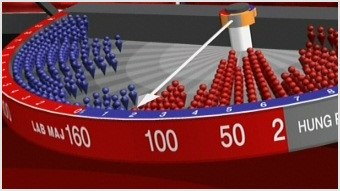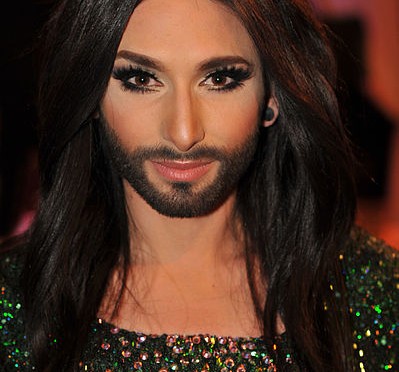The Eurovision Song Contest was established post-War to bring nations together in peaceful pop appreciation but as ‘greater’ Europe’s nations (including Russia and Israel) battled it out over national pop songs (mostly sung in English!) on 10 May, new conflicts arose.
 First, there was the new enmity between Russian and Ukraine and the break-up of the former Warsaw-pact voting block. Second, there was the usual analysis and outcry at nationalist and neighbouring countries mutual self-interest voting patterns, not to mention vast divisions between the newer 50/50 split between public and professional jury votes.
First, there was the new enmity between Russian and Ukraine and the break-up of the former Warsaw-pact voting block. Second, there was the usual analysis and outcry at nationalist and neighbouring countries mutual self-interest voting patterns, not to mention vast divisions between the newer 50/50 split between public and professional jury votes.
Finally, there was the homophobia and indeed, transphobia, of some nations (Belarus, Russian and even some Austrians) complaining about Austria’s label-defying gay genderqueer drag diva Conchita Wurst, who went on to win the contest.
Russia-Ukraine | Reaction | Voting | Camp/Queer History | Conchita Wurst | Bearded Women

2014’s Eurovision Song Contest (ESC) in Copenhagen, Denmark, was the 59th competition, having begun in 1956. This year, 37 nations, competed, and it top-ten trended on Twitter most of the week, such is the European, if not international following of the entertainment extravaganza.
Eurovision 2014 – Russia and Ukraine
Tuesday’s semi-final had more at stake than music as rival posturing nations Russia and Ukraine continued their war of words.
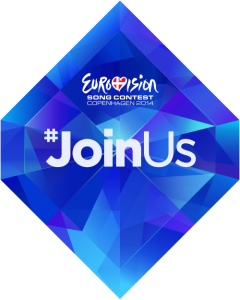
Both Russia and Ukraine made the semi-finals with Ukraine’s entry drawing cheers and Russia’s, boos. Eurovision 2014’s tagline #JoinUs had a darker new meaning as Russia wants Ukraine to “join us” having already taken Crimea to a dubious vote – just like Eurovision!
One of last year’s Eurovision stories was Twitter top-trending as hundreds erroneously re-tweeted a BBC story about Azerbaijan’s failure to nominate any points to Russia’s entry in the Eurovision song contest and Russia’s foreign minister calling this “outrageous”! Except this was 2013, and a conspiracy theory at that, with the report that Azerbaijan’s President subsequently ordered an inquiry into how its votes for Russia apparently went missing. In the game of Eurovision “Risk” Russia had given Azerbaijan’s entry maximum “douze points”.
This year, Russia’s entry, the Tolmachevy Twins, aged 17, seemed perfect Eurovision fare, beautiful on the eyes and ears, a popular choice – apart from being Russian. Their song and teenage innocence with respect to all the international politics meant they were received well until they progressed to the final and were booed by the Danish and international semi-final and final audiences, who seemed strongly anti-Russia’s stance against gay rights, Crimea and the Ukraine. During the awarding of points almost every award of any points to Russia was greeted with jeers rather than cheers as the voting public punished Putin for Russian territorial aggression and anti-LGBT laws.
Ukraine’s own entry, Mariya Yaremchuk, also qualified for the final with the added visual drama of a suited male dancer running inside a giant hamster wheel to her song “Tick-Tock”.
In the end, Conchita Wurst of Austria won by a large margin 290pts (beating Netherlands 238pts), but Ukraine, with 113 points to Russia’s 89 points, will be pleased it came 6th over Russian’s 7th place! Ironically, Russia gave Austria (5pts) one more point than it gave to Ukraine (4pts).
Russian news sites during the week reported on the respective nations’ entries as “aggressive”, “militant” or about supposed political messages hidden in the songs.
Russian and International Reaction to the Eurovision 2014 Winner
The morning after Eurovision 2014 was won by gay genderqueer drag artist from Austria Conchita Wurst had Russian politicians reaching new lows of homophobia and European “liberal” condemnation.
The Russian Deputy Prime Minister, Dmitry Rogozin, tweeted that the Eurovision result “showed supporters of European integration their European future: a bearded girl.”
According to TheJournal.ie, another Russian politician, the ultranationalist leader of the Liberal Democratic Party (LDPR), Vladimir Zhirinovsky, told Rossiya-1 state television:
“There’s no limit to our outrage. It’s the end of Europe. It has turned wild. They don’t have men and women any more. They have ‘it’. Fifty years ago the Soviet army occupied Austria. We made a mistake in freeing Austria. We should have stayed.”
Zhirinovsky has been described as “One of the most enduring fruit loops in Russian politics” – note that was ‘enduring’ not endearing. He is stubbornly sexist, homophobic, racist, anti-Western. He has called for the deportation of Chinese and Japanese people, threatened a female journalist with rape, and crazily suggested that the British royal baby would suck Russian blood!
Russian hip-hop rapper Timati had over 76,000 likes in just 15 hours for his Instagram post about Conchita Wurst in which he wrote that her win was symptomatic of a “complex mental disorder of modern society”. He went on to bemoan having to explain gay kissing to children, bearded trans – “and that’s supposed to be normal”,and to praise Putin for banning LGBT Pride Parades.
Russia’s reactions are somewhat, ironic and hypocritical given that in the 2003 Eurovision Contest they were represented by faux-lesbian t.A.T.u. and their same-sex kissing. Again, in February, at the Sochi Winter Olympics the Russian Olympic team marched out to the music of t.A.T.u.’s Lena Katina and Yulia Volkova, dressed as schoolgirls, kissing in the rain.
Eurovision Block Voting Scandals
Eurovision’s extra political undercurrent this year is nothing new as block-voting has been allegedly going on for decades, whether Greece-Cyprus, Scandinavian, Balkan or Warsaw pact blocks. Whilst mutual voting may have helped Ukraine win in 2004, Russia in 2008, and Azerbaijan 2011, it seems that for many former Soviet Union/Warsaw Pact countries cooperation is now over with Russia’s perceived aggression in the real world outside of camp pop culture.
Eurovision’s Camp GenderQueer History
Eurovision is no stranger to camp, drag or trans artistes, such as Israel’s pioneering 1998 trans winner, Sharon Cohen performing as Dana International. Sharon had come out as transgender aged 13 and had transsexual surgery (SRS/GRS), aged 21, in London in 1993. Initially, she had performed as a drag act but she had also felt female from a very young age. Her background was Romanian and Yemenite Jewish and her Eurovision entry received strong opposition from Orthodox Jews, calling her “deviant” and other traditionalists who attempted to block her competing in Eurovision as Israel’s entry. She said after winning, “I want to send my critics a message of forgiveness and say to them: try to accept me and the kind of life I lead. I am what I am and this does not mean I don’t believe in God, and I am part of the Jewish Nation.” Winning meant Israel hosted 1999’s Eurovision and again conservative forces attempted to keep “sexual perversion” out of Israel’s “holy city”, Jerusalem.
Eurovision 2002 saw Slovenia set feathers ruffling by entering the first drag act, rather than a transwoman, a trio called Sestre.
In 2007 double divas ruled the competition as Denmark’s DQ performing “Drama Queen” came from the back to pip Ukraine’s own Dolce & Gabbana wearing drag act Verka Serduchka to win the contest. Verka, a.k.a. Andriy Danylko, had to overcome Ukrainian opposition to their act in the form of radio protests and statements in the Ukraine Parliament labelling him as “grotesque and vulgar”.
Last year, Turkey allegedly refused to broadcast the show because of a same-sex kiss by Finland’s entry.
Austria’s GenderQueer “Bearded Lady” Drag Queen
This year’s Eurovision has seen Austria’s innovative genderqueer entry, Conchita Wurst, steal the show and go on to win it. She has not been without controversy, though, and has attracted her own oppositional battles, but along gender/sex/uality lines not state sovereignty lines as with Russia and Ukraine.
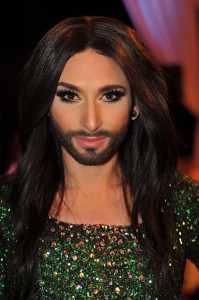
Vienna-based Tom Neuwirth performed as a “drag” persona Conchita Wurst – a thinly veiled euphemism for “Vagina Sausage”. What makes this creation stand out further is that Conchita sports a very neat and kempt beard! Well, thickly brushed on eye shadow to be accurate.
It is ‘said’ that Tom-Conchita identifies as “gender neutral”, “trans” and prefers female pronouns. “While identifying as gender neutral, she uses female pronouns to describe herself but still likes to play with drag, satire and gender identity.” Hence most labels struggle to fit them, somewhere between gender identity and gender performance, neither traditional drag nor typical trans, male nor female, seem to 100% fit, and their preference for “gender neutral” seems best, whether that extends to non-binary is something we just don’t know.
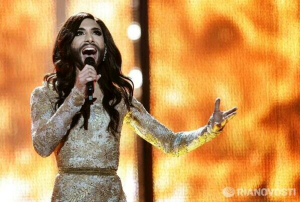 Tom-Conchita’s Eurovision official profile page gets all the gender pronouns mixed up – and some people are still mixed up in trying to define her, I say, let her stay unboxable.
Tom-Conchita’s Eurovision official profile page gets all the gender pronouns mixed up – and some people are still mixed up in trying to define her, I say, let her stay unboxable.
No doubt some trans may be horrified by Conchita’s depiction of a “bearded lady” after issues with British TV’s Little Britain and Paddy Power’s transphobic “Spot the Tranny” competition. Conchita is happy to use the term “bearded lady” and adopts it as a “symbol of tolerance”. Asked what was special about Conchita’s entry, she said:
“For me the most special and honoring thing is that Austria shows tolerance and acceptance and I’m so happy to be this statement. I’m allowed to be the voice of their beliefs during this time and this really makes me very proud. We, and not at least myself, want to stand for a society without hate and discrimination. And if I’m honest, I think everyone of the contestants should stand for the same, cause we are joining a very opend minded project, so they should be open minded too…I really hope that I get the chance to change some minds all around Europe. I want to show them that you can look whatever you want and that everybody must have the right to live their life however they want it, if nobody gets hurt…I really want to convince them to be the best version of themselves rather than a bad copy of someone else! You can do whatever you want if you’re not hurting anyone.” [sic]
No stranger to controversy and prejudice, their involvement has attracted protests from homophobes and transphobes in Austria, Belarus and Russia, describing the competition as full of “European liberals” and “a hotbed of sodomy”. One Russian politician has called Conchita an “Austrian freak” and that “the future of our children depends on us” banning them from Eurovision. Armenia’s entry, Aram Mp3, described Conchita as “not natural” and offered to, “help her to … decide whether she is a woman or man”. Conchita responded with:
“I am a working woman/queen and an incredibly lazy young man in my free time and that is not going to change. If you have problems understanding that, then I would be happy to sit down with you and explain it to you in more detail. And with your homophobic comments, that is a conversation that we really need to speak about.”
Curiously, trying to find the exact source of Conchita’s response results in about 50 references to “working woman” and some 80+ to “working queen”. For instance, the HuffPost version has “I told him I don’t want to be a woman. I am just a working queen and a very lazy boy at home.” For a transwoman, a beard and a name with all the sexual innuendos Conchita Wurst has would be somewhat strange. Yet for a drag queen she seems to prefer life as a woman to that of a gay man. Whatever her labels and self-identity she is free to be who she is and/or wants to be. Conchita said:
“I feel more comfortable in this persona than being a boy at home … Being a teenager, a gay teenager, in such a small village is not that much fun. I am part of the gay community and most gays have a similar story to mine.”
Even in liberal California a Psychology Professor polled their class and 77 out of 138 said they found Conchita’s appearance “offensive or confusing”. Obviously, it is confusing, but there is a big leap from confusing to offensive. They also said:
“I think having a beard and having a feminine body at the same time the singer shows that he/she is still in the process of transformation (from male to female, Which is ok) …[but] … there are only two kinds in all species in the world………male or female? Anything in between is considered unusual… But in Conchitas case, I think he/she is crossing a very thin line which actually is not only unethical, (and I don’t care about the ethical part) but just confusing, absurd and almost unexceptable. Every single one of my gay friends thinks this way and I can prove it… Even my gay friends are offended by Conchhita. Actually they’re furious and angry at her.” [sic].
Conchita’s song called “Rise Like a Phoenix” can be heard here:
You can follow Conchita on Twitter or on Facebook, where she has 40,000 likes, around the same number as the Austrian facebook campaign against her which also attracted nearly 5000 signatures on change.org. Conchita summed up her motivation and message in a Radio Free Europe interview:
“My stance is that I fight for something positive rather than against something negative. I was always an outsider and I was confronted with discrimination. I don’t want this to happen to the next generation.”
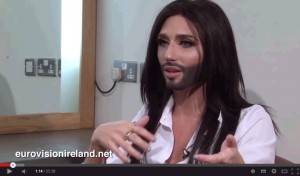 Garrett Mulhall Of EurovisionIreland.net interviewed Conchita in November 2013 about her music and mission, ideology and identity, and she had this to say:
Garrett Mulhall Of EurovisionIreland.net interviewed Conchita in November 2013 about her music and mission, ideology and identity, and she had this to say:
[Conchita] “I have arms like a man, face like a girl, and also the beard, and I told them that this is, that there are people out there who are in between you know and I took them by the hand and I said you are here (the boy), the girls – here, and I am just in the middle…I think they understood that there is more than a surface of a person” (11m27s)
[Garrett] “I think you being at Eurovision is a pivotal point in Eurovision’s history, and it’s one that I’m very glad about, because, … Eurovision was established so long ago to bring a war-torn Europe together and times have moved on now where we’re trying to bring different people from social backgrounds or gender backgrounds or … whatever, … we don’t want to label people anymore, and tolerance is obviously a very important thing to you…” (12m20s)
Many have challenged her sexuality, gender identity, presentation and pronouns – She prefers “she” and “her” and is more comfortable as Conchita than Tom the “lazy boy” she dresses down as, however. her male partner didn’t know she was Conchita as well for a week or two.
Our need to label, even as minority communities, to claim, correct or reject, her personal expression, is indicative of a common human need to categorise, define and then decide whether they are a threat or not. She is a threat to stereotypes of man, woman, gay, trans, drag queen, for she does not conform to any in a traditional way. Some trans are up in arms over her beard and for the possible inclusion of a drag queen under their umbrella. Some gays see her as too female too often. Some women oppose her use of female pronouns and, again, the beard.
By her own description, she does not fit, but is “in between”, non-binary, and that she is more than just her surface. By her own admission she is not transgender, or at least it is more artistic expression, “I am a drag artist”, she says.
Indeed, in performance, and initially in the interview there is a touch of drag and gender performance about her, but as she settles into talking about equality and acceptance, the seriousness takes over and her feminine expressions remain, but more integrated less performative. These are not judgements or criticisms, for I find the more I listen to her the more I love her. We all need to get beyond the “surface” of a person and cease visual and labelled judgements.
Her goal according to the Irish interview (around 15-17 mins in) is for people to engage and talk about difference, to start to think, to accept – whether they like/love it or not. That much she can 100% regard as being successful in. People are talking – good for her! Conchita made it through Thursday’s semi-finals to Saturday’s live final after some delays down in part to questions as to whether Belarus had even broadcast her act, such is the opposition to her from some quarters. Indeed, after her win on May 10, she was condemned by the Russian Orthodox Church and many in Russia were shaving their beards off in protest – the men that is!
Conchita Wurst performs at London LGBT Pride
After Eurovision Conchita Wurst has been in great demand and was the headline performer at 2014’s Pride show in Trafalgar Square, London on 28 June. She was introduced by veteran gay rights activist and Magneto/Gandalf actor Sir Ian McKellen with the words:
“Showbusiness has always led the way when it comes to the freedom to be yourself. So, Conchita is following in the footsteps of our predecessors. There is a long tradition of outrageousness and confidence that performers embody, and that has an enormous impact. It clears the way for others to dare to be themselves. She has done just that.”
Conchita Wurst said before the parade how much she was “looking forward” to it and what Pride meant to her:
“Let us be proud about who we are and let us give a statement for love, respect and tolerance. And most of all let us be proud and think about those LGBTI people around the world, who can’t make a Gay Pride in their countries.”
Chair of London LGBT+ Pride, Michael Salter said:
“Conchita is an incredible example of the power of having the #freedomto be oneself. Winning Eurovision, she raised the profile of the LGBT+ community across a continent and sent an important political message. We are thrilled that she is coming to celebrate Pride in London.”
Balpreet Kaur, bearded Sikh woman
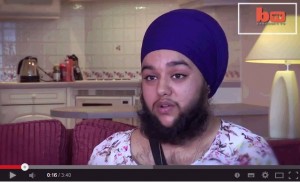 All of this recalls the recent challenge to not only typical female gender presentation but also traditional Sikh expectations by Balpreet Kaur who has Polycystic Ovary Syndrome (PCOS) but has embraced her facial hair which it caused and let it grow to a full beard. Her baptism into the Sikh faith now requires her not to cut it. At school and online she was bullied to the point of self-harm and felt suicidal but found huge public support and acceptance for her brave stand. She has now accepted herself, her beard, and discovered a new confidence and humour – read more about her.
All of this recalls the recent challenge to not only typical female gender presentation but also traditional Sikh expectations by Balpreet Kaur who has Polycystic Ovary Syndrome (PCOS) but has embraced her facial hair which it caused and let it grow to a full beard. Her baptism into the Sikh faith now requires her not to cut it. At school and online she was bullied to the point of self-harm and felt suicidal but found huge public support and acceptance for her brave stand. She has now accepted herself, her beard, and discovered a new confidence and humour – read more about her.
[Parts of this article were initially posted here and here.]
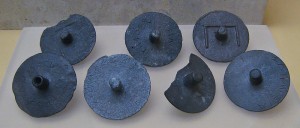 Voting using pebbles or such common items such as mussel shells was certainly in use in 5th century BC Greece and earlier. By the 4th century BC some were using bronze or lead ballots with solid or hollow axles through the middle to distinguish between voting outcomes. The ballot with the pierced axle is inscribed “psephos demosia” or “public ballot”.
Voting using pebbles or such common items such as mussel shells was certainly in use in 5th century BC Greece and earlier. By the 4th century BC some were using bronze or lead ballots with solid or hollow axles through the middle to distinguish between voting outcomes. The ballot with the pierced axle is inscribed “psephos demosia” or “public ballot”.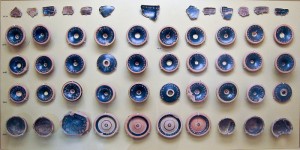 By the 2nd century BC the Romans were beginning to use paper ballots – more practical than the Greek use of ostraka, shells or broken pottery sherds/shards, used to inscribe the names of people to be voted for as election nominees, or for rejection, as persons to be ostracised. Hence why, and from where, we get the word ostracism.
By the 2nd century BC the Romans were beginning to use paper ballots – more practical than the Greek use of ostraka, shells or broken pottery sherds/shards, used to inscribe the names of people to be voted for as election nominees, or for rejection, as persons to be ostracised. Hence why, and from where, we get the word ostracism.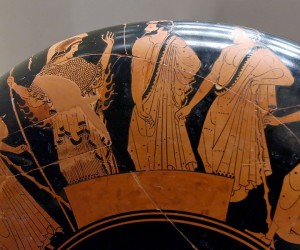 A Greek wine cup of the period,in the J Paul Getty Museum Collection, depicts an early voting scene with an unhappy outcome. During the Trojan War, after the killing of Achilles, two Greek heroes, Ajax and Odysseus, both claim and compete for Achilles’ possessions – his weapons and armour, Ajax having saved and retrieved Achilles’ body from battle with the Trojans. Rather than argue or duel a vote is held. The terracotta wine cup shows Odysseus getting more pebbles and Ajax’s head-in-hands disappointment leading to him committing suicide by falling on his sword. He’d lost by just one vote and ironically took his life on a pebble beach, as depicted on the inside of the cup.
A Greek wine cup of the period,in the J Paul Getty Museum Collection, depicts an early voting scene with an unhappy outcome. During the Trojan War, after the killing of Achilles, two Greek heroes, Ajax and Odysseus, both claim and compete for Achilles’ possessions – his weapons and armour, Ajax having saved and retrieved Achilles’ body from battle with the Trojans. Rather than argue or duel a vote is held. The terracotta wine cup shows Odysseus getting more pebbles and Ajax’s head-in-hands disappointment leading to him committing suicide by falling on his sword. He’d lost by just one vote and ironically took his life on a pebble beach, as depicted on the inside of the cup.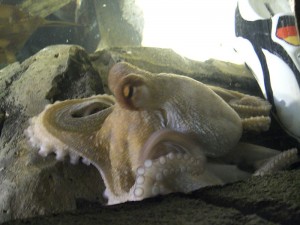 Polling and predictions are perilous tasks for the non-psychic, being as relied upon in reality as an aquarium octopus vulgaris divining the World Cup results. Actually, Paul the German ‘common’ (for that is what vulgaris literally means) octopus was fairly accurate in his short 2 year life at predicting German football results! He was 85% right about the 2010 World Cup results and 100% right about the German games.
Polling and predictions are perilous tasks for the non-psychic, being as relied upon in reality as an aquarium octopus vulgaris divining the World Cup results. Actually, Paul the German ‘common’ (for that is what vulgaris literally means) octopus was fairly accurate in his short 2 year life at predicting German football results! He was 85% right about the 2010 World Cup results and 100% right about the German games. The Swingometer was invented by Peter Milne and enhanced by psephologist Robert McKenzie, who, though Canadian, was one of the main BBC’s General Election programme presenters (1955 to 1979). McKenzie had also been, in 1963, a strong interviewer, a.k.a. early Jeremy Paxman-style, of Lord Hailsham during the infamous Profumo scandal.
The Swingometer was invented by Peter Milne and enhanced by psephologist Robert McKenzie, who, though Canadian, was one of the main BBC’s General Election programme presenters (1955 to 1979). McKenzie had also been, in 1963, a strong interviewer, a.k.a. early Jeremy Paxman-style, of Lord Hailsham during the infamous Profumo scandal.